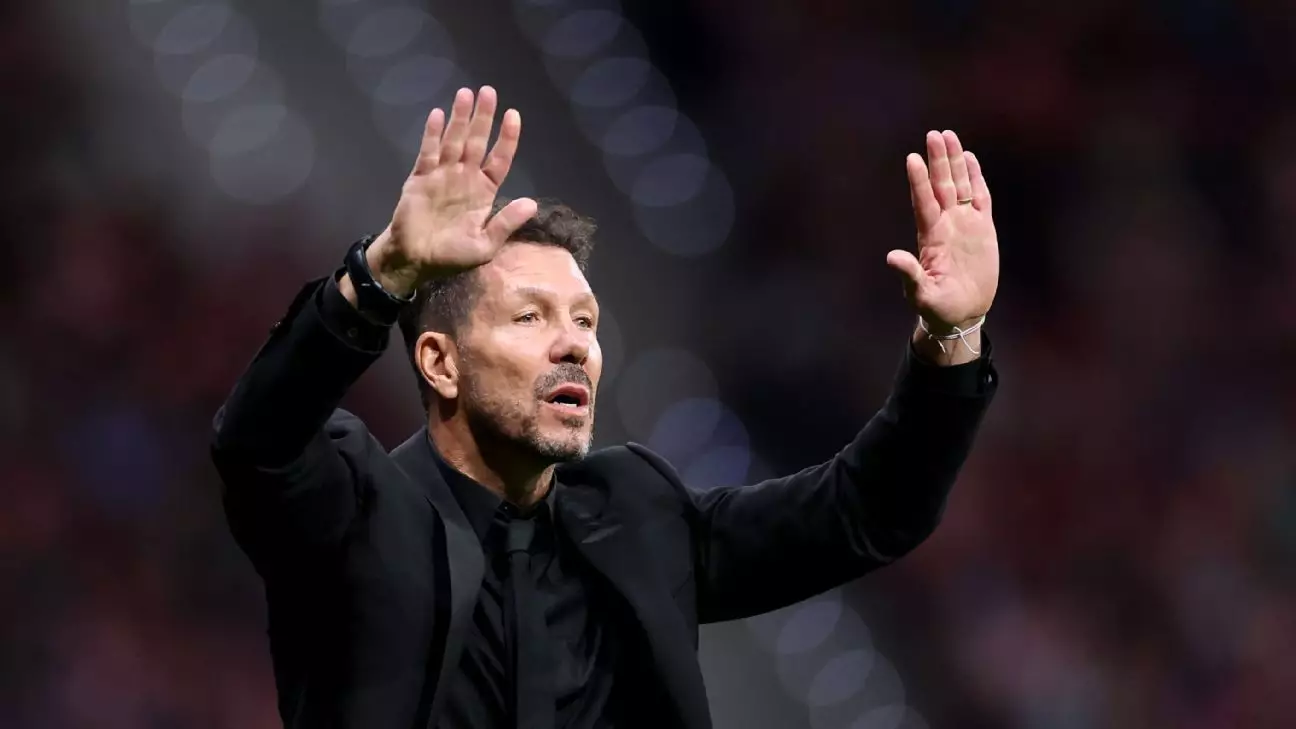In the high-stakes world of football, the excitement surrounding a derby match often spirals into a frenzy of emotion, culminating in fan behaviors that can sometimes cross the line. Such was the case during the recent Madrid derby, where the intensity of the competition between Atlético Madrid and Real Madrid resulted in a dangerous escalation. Objects, including lighters and plastic bottles, were hurled onto the pitch by frustrated fans, leading to a temporary suspension of the game. This incident not only interrupted the flow of the match but also raised significant concerns about fan conduct and the accountability of both supporters and players.
The moment the match was halted—approximately midway through the second half—saw a collective gasp from the crowd. Real Madrid had taken the lead, thanks to a goal by Éder Militão, and tensions among Atlético supporters evidently simmered. In the aftermath of the incident, Atlético’s head coach, Diego Simeone, publicly decried the behavior of the fans while also pinpointing the role that player conduct can play in inflaming tensions.
Simeone’s reactions to the incident were multi-faceted; he condemned the act of throwing objects but also adopted a reflective stance, urging players to be mindful of their interactions with fans. He made explicit reference to Real Madrid’s goalkeeper, Thibaut Courtois, whose exuberant goal celebration after Militão’s strike appeared to provoke wrath among some Atlético supporters.
In an interview with DAZN, Simeone remarked, “We the protagonists don’t help when we provoke the fans.” His comments suggest an awareness that while the fans hold responsibilities for their actions, players too share the burden of maintaining a respectful and sportsmanlike atmosphere. The notion that player celebrations could incite disruptive behavior poses challenging questions about how athletes can balance expressing joy for success while remaining sensitive to heated rivalries.
The game was paused on account of the disturbances, a decision that was met with support from Real Madrid’s coach, Carlo Ancelotti. As the referee Mateo Busquets Ferrer halted the proceedings, he sought to prioritize safety over the continuation of play. Ancelotti’s acknowledgment of the referee’s decision points to a broader recognition of the need for robust regulations designed to protect players, officials, and hopefully dissuade incendiary actions from the stands.
In these situations, the role of the stadium’s security and law enforcement also becomes crucial. Atlético Madrid’s management announced that they were working to identify individuals responsible for the throwing of objects, a move that reinforces the idea that such behavior is not only unacceptable but will be met with serious consequences.
The aforementioned events accentuate a pressing issue within sports culture: the intersection of passionate fandom and antisocial behavior. Atlético Madrid’s statement post-game indicated that instances of hostility adversely impact the reputation of the club and the sport as a whole. In an era where sporting events serve as communal gatherings, the responsibility lies with fans to foster an environment conducive to healthy competition.
Moreover, the recent behavior observed at the derby transpired against the backdrop of other troubling behaviors, such as the racist undertones associated with a social media campaign targeting Real Madrid’s Vinícius. This incident shines a light on not just the immediate repercussions of fan actions but also the cultural climate that allows such occurrences to take root. The call for accountability extends beyond the perpetrators to include institutions, supporters, and indeed players who hold influence over these vibrant yet volatile environments.
In the wake of the derby controversy, there remains a critical need for reflection and, more importantly, action. The statements from coaches and club representatives signal an opportunity to foster dialogue about the responsibilities all parties carry in ensuring that football retains its spirit as a celebration of athletic prowess and community. Moving forward, the objective must be to create an environment where passion does not bleed over into violence—the kind of atmosphere where respect and sportsmanship prevail over hostility.
Ultimately, the need of the hour is a concerted effort from clubs, players, and fans to not only celebrate their teams but to uphold the integrity and safety of the sport. With vigilant measures and collective accountability, perhaps future derbys can epitomize the excitement of competition without devolving into episodes of violence and disarray.

